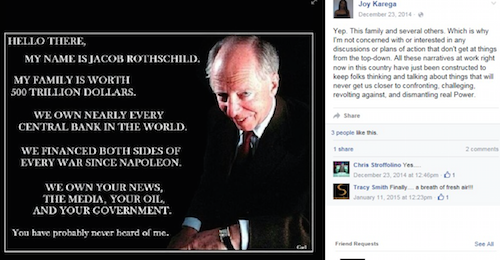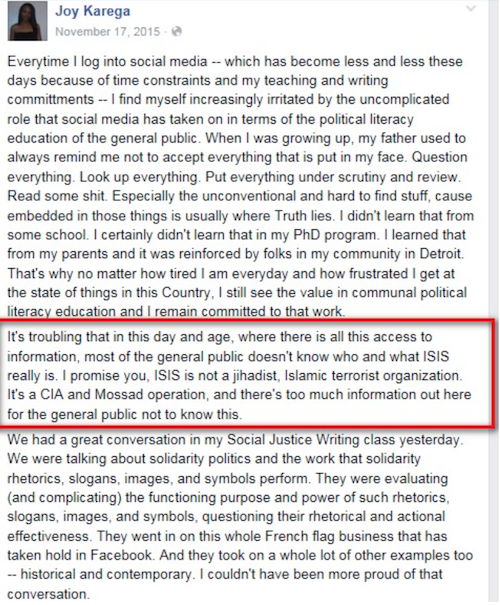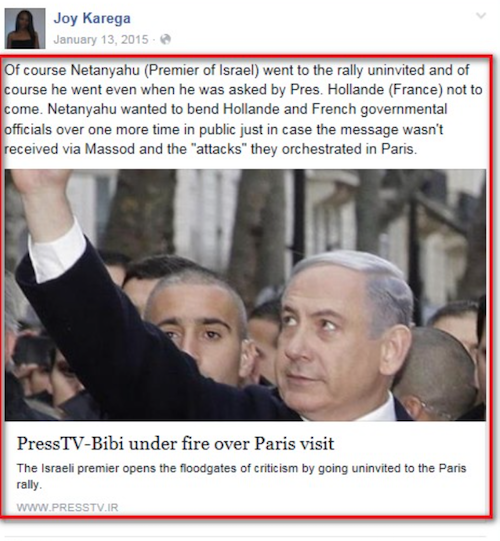You have /5 articles left.
Sign up for a free account or log in.
One of the biggest privileges of being a professor -- especially a tenured one -- is having academic freedom. While the real protections offered under the principle vary from campus to campus, faculty work is at least founded on the idea that there’s room to express even unpopular ideas or beliefs. But are arguably unacademic opinions -- inflammatory falsehoods that have no apparent basis in fact -- also covered? A recent case at Oberlin College raises questions about whether all ideas are created equal when it comes to academic freedom.
Earlier this year, several hundred students and alumni at Oberlin College expressed their concerns about what they described as escalating anti-Semitic rhetoric on campus, in an open letter to President Marvin Krislov and others. “As Oberlin students and alumni representing a diversity of views on Israel, we accept criticism of its leadership and policies,” the signatories wrote. “However, we do not believe Israel should be singled out for condemnation and we object to questioning its right to exist. We also abhor the tactics of Oberlin’s pro-[boycott, divestment and sanctions] student organizations that intimidate, threaten and coerce Jewish students, which we have seen and heard in numerous written and spoken reports.”
The students and alumni didn’t refer to Joy Karega, an assistant professor of rhetoric and composition studies, by name, but the professor has been named in subsequent media coverage as someone aggressively promoting pro-boycott positions on social media. (She's also reportedly come under fire for co-sponsoring a lecture later this week called "Fighting Apartheid Since 1948: Key Moments in Palestinian and Black Solidarity.")
Some of Karega’s posts -- which have since apparently been deleted but were captured in screenshots by the pro-Israel blog The Tower -- state opinions that, while controversial, are shared by other supporters of the Israel boycott movement. “Let some tell it, an attack on Zionism is an attack on Jews,” Karega wrote on Facebook last January, for example, after the attacks on Charlie Hebdo in Paris. “It’s anti-Semitic, so they say. Total nonsense. And I stopped letting folks bully me with that ‘You’re being anti-Semitic’ nonsense a long time ago.”
Also inflammatory -- but arguably a legitimate symbol of her political beliefs -- Karega shared with that post an image of an ISIS fighter taking off a mask of Israeli Prime Minister Benjamin Netanyahu. Another posted image recalls World War II-era anti-Jewish propaganda, showing Jacob Rothschild, a member of a well-known Jewish banking family, staring down the words, “We own your news, the media, your oil, and your government.”

Whether or not all that’s covered by academic freedom may be up for debate -- but not here. This story is primarily concerned with a series of other posts, in which Karega makes declarations that most educated people, let alone people with doctorates and regardless of their positions on Israel, would reject as unsupported by fact. All were posted while she was on the faculty at Oberlin.
In November 2015, for example, she wrote that ISIS is really part of Mossad, an Israeli intelligence unit, and the U.S. Central Intelligence Agency. “It’s troubling that in this day and age, where there is all this access to information, most of the general public doesn’t know who and what ISIS really is. I promise you, ISIS is not a jihadist, Islamic terrorist organization. It’s a CIA and Mossad operation and there’s too much information out there for the general public not to know this.”

Quoting a blog that reports on many conspiracy theories and describes itself as a “weekly whack at the global oligarchy,” Karega also last year posted that Israel was responsible for the downing of Malaysian Airlines Flight No. 17, which has widely been attributed to Russian-backed separatists in Ukraine. In another post, she wrote that Netanyahu visited Paris after the Charlie Hebdo massacre “just in case the message wasn’t received via Mossad and the ‘attacks’ they orchestrated on Paris.” (Netanyahu was in Paris after the attacks, but to visit Jewish people in France who were attacked.) Karega shared a video from Nation of Islam leader Louis Farrakhan suggesting that Zionists and Israeli Jews were behind 9/11, and wrote that he was "truth-telling," as well, according to The Tower.

In a Statement on Personal Views issued in response to media requests about Karega, Oberlin distanced itself from Karega’s statements but backed her right to free speech. Oberlin “respects the rights of its faculty, students, staff and alumni to express their personal views,” reads the note. “Acknowledgment of this right does not signal institutional support for, or endorsement of, any specific position. The statements posted on social media by [Karega] are hers alone and do not represent the views of Oberlin.” (Karega did not respond to requests for comment.)
Compare Oberlin’s response to the recent firing of James Tracy, a tenured communications scholar, by Florida Atlantic University, related to declarations on his blog that the 2012 massacre at an elementary school in Newtown, Conn., was really an elaborate government play for more gun control laws. (A termination letter sent to Tracy in January said that he was being terminated for failing to turn in outside employment or professional activity reforms in a timely manner, but the letter referenced activity on his blog and Tracy maintains his case is about free speech.)
Certainly there’s more of a consensus around senseless gun violence involving children than there is around the Israel-Palestine debate. But the two different institutional responses suggest that there are different schools of thought as to whether patent falsehoods are protected by academic freedom.
Covering the Crap? It Depends
Some academics, bloggers and several Israeli newspapers have called for the college to speak out or take action against Karega, saying free speech shouldn't be used as a veil for hate speech, especially in a university environment. Alan Dershowitz, an emeritus professor of law at Harvard University, for example, told The Tower that if Karega "had expressed comparably bigoted views about blacks, Muslims or gays," Oberlin would have condemned her views, even if it defended her right to express them. But to most experts on academic freedom, Oberlin is doing the right thing.
For the American Association of University Professors, the distinction is one of disciplinary expertise and professional competence, said Hans-Joerg Tiede, associate secretary in the department of academic freedom, tenure and governance. If, for example, a physics professor declared on Twitter that the Sept. 11 attacks were a hoax, AAUP would advocate for the professor’s right to free speech in extramural utterances (it doesn’t distinguish between free speech in person or online). But if the physics professor declared that the world is flat, denying all scientific evidence to the contrary, that could call into question his or her professional fitness.
“There’s a somewhat strange consequence that the less something relates to your discipline, the more protected you are on a general level,” Tiede said. “The closer something is to your area of expertise, you must in some sense be more careful that what you say doesn’t create concerns.”
Applying that logic to Karega’s case isn’t necessarily clear-cut. She’s not a political scientist, but she’s trained in rhetoric and studies, black political and protest literacies, and social justice writing, according to her faculty bio. Presumably, she understands the power of her words.
Tiede said AAUP doesn’t make such “judgments of substance” but rather defers to a committee of the professor’s peers. In any case where a professor’s fitness is called into question by public statements, he said, the faculty member should be entitled to hearing before an elected faculty body that considers the professor’s professional record as a whole.
John Wilson, an independent scholar of academic freedom and co-editor of AAUP’s "Academe" blog, had a slightly different take, emphasizing the importance of whether the false utterances were extramural -- on the professor’s own time, not connected to her work at Oberlin -- or not.
"I believe in a strong right to academic freedom, especially with regard to extramural utterances,” he said. “The rule is that you hire and fire faculty based upon their academic qualifications, not their political opinions. Even when those beliefs are false and stupid, as they clearly are in the case of Karega, we should refute them, not punish them.”
Wilson recalled the case of Revilo P. Oliver, a classics professor at the University of Illinois at Urbana-Champaign, some 50 years ago, who came under fire for conspiracy theories about the assassination of John F. Kennedy. There were calls for him to be fired, but academic freedom prevailed in that case, Wilson said.
“When you evaluate professional work, then the truth matters,” he added. “But you can't impose professional standards on every tweet, Facebook post or offhand remark to a friend.” For that reason, AAUP’s professional fitness standard is rarely reached in such cases, he said.
Wilson suggested that interest in Karega’s record might be better directed at her teaching and scholarship. Teaching is what matters most to several other prominent scholars of academic freedom.
Joanna Williams, a senior lecturer of higher education at the University of Kent in Britain, education editor at Spiked, and author of a new book called Academic Freedom in an Age of Conformity: Confronting the Fear of Knowledge, said she drew the distinction between teaching and expressing opinions (which in turn has implications for professional fitness).
“Academic freedom means she can -- just like every other citizen -- express opinions, no matter how offensive or blatantly ridiculous,” Williams said of Karega. But in a teaching situation, she said, “academics have a responsibility to teach content grounded in scholarship, evidence and research.”
That content may later be proven wrong, she said, and colleagues have a responsibility to challenge teaching content that is “ridiculous and very obviously untrue.”
Stanley Fish, the Davidson-Kahn Distinguished University Professor of Humanities and Law at Florida International University and author of Versions of Academic Freedom: From Professionalism to Revolution, said Karega can say whatever she wants on social media or even in her scholarship, even if it’s patently false and relates directly to her subject area -- as long as she doesn’t attempt to present it in class as a fundamental truth (and there’s a sound pedagogical reason for presenting it at all). Fish said that the Steven Salaita case at the University of Illinois, for example, should have hinged entirely on Salaita’s teaching record -- not uninterrogated fears about what his controversial, anti-Israel tweets might mean about his ability to teach.
“Are you trying to inform your students about the various views or perspectives that are out there or are you trying to enlist your students in some kind of political agenda?” Fish asked. “It’s very simple, and if you keep those other questions out of it, a lot of confusion can be avoided.”





